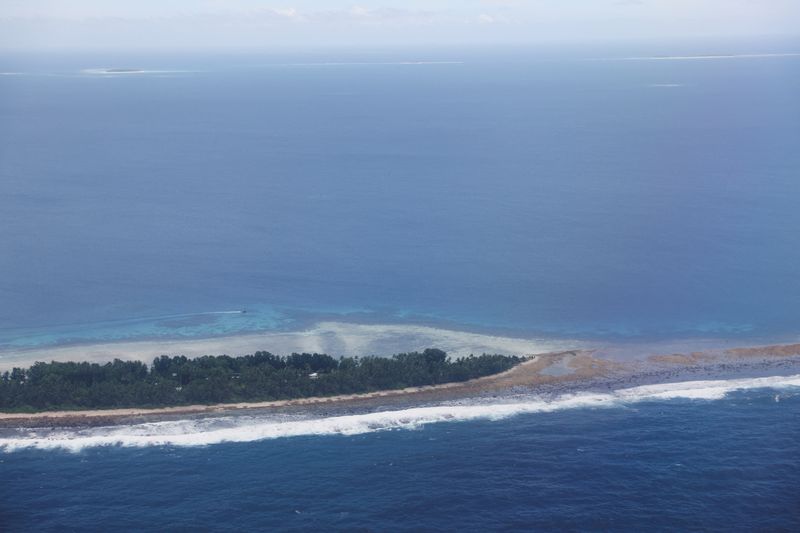By Doyinsola Oladipo
NEW YORK (Reuters) -Leaders of developing countries threatened by climate change told rich nations at the United Nations General Assembly that they are falling far short of promises to fund measures to combat rising sea levels, droughts and deforestation.
“It is past time for the rich world to meet its obligations and get money to where it’s needed most,” Marshall Islands President Hilda Heine told the assembly last week. “We’ve heard the promises – but promises don’t reclaim land in atoll nations like mine.”
Wealthy countries have struggled to meet climate finance commitments. Their funding reached $100 billion a year, an amount agreed upon in 2009, two years late in 2022.
At a U.N. climate summit last year, leaders agreed to provide developing countries $300 billion a year by 2035. Many developing countries blasted that sum as far too small to meet the need. Experts have estimated that developing countries need at least $1 trillion annually by the end of the decade.
Leaders of developing countries say rich nations must provide resources to cope with climate change, a crisis they created.
Since the Industrial Revolution, the U.S. has been the largest cumulative emitter of greenhouse gases, the primary cause of climate change, according to an analysis by Our World in Data.
“Those who shoulder the blame must foot the bill,” said Fiji Prime Minister Sitiveni Rabuka last week during the week-long leaders session.
CLIMATE CHANGE FORCES PEOPLE TO FLEE, GHANA SAYS
In President Donald Trump’s second term, the U.S. withdrew for a second time from the Paris agreement and halted most climate finance commitments. Under his predecessor, Joe Biden, the U.S. provided about $11 billion a year or about 8% of global climate finance, according to an analysis by Carbon Brief.
During his address to the General Assembly last week, Trump dismissed climate change as “the greatest con job” in the world.
Last year was the hottest year on record as global temperatures exceeded 1.5 degrees Celsius above the pre-industrial era for the first time, bringing the world closer to breaching the pledge governments made in the Paris pact.
Ghana President John Mahama pushed back against growing anti-immigration policies in the global north, one of Trump’s top priorities, attributing much migration to climate change.
“Many of those migrants are climate refugees,” Mahama told the General Assembly. “When the desert encroaches and our villages and towns become unlivable, we are forced to flee.”
Somali President Hassan Sheikh Mohamud told the assembly that climate change “is forcing governments in developing countries, including my own, to make impossible financial trade-offs which hamper our own aspirations for investing in resilience and development.”
Droughts, floods and rising seas erode livelihoods and displace families, threatening to undo progress on peace and development, and around 10% of developing nations’ budgets are spent on responding to climate change, Mohamud said.
Germany said on Monday it provided a record 11.8 billion euros for international climate financing in 2024 and met its global commitment by allocating at least 6 billion euros of public funds to the cause.
But leaders of island nations including Tuvalu, Comoros, Madagascar and St. Lucia called for funding to flow to the countries that need it most with fewer obstacles.
“We call for equitable and simplified access to climate financing,” said Comoros President Azali Assoumani.
Another major greenhouse gas emitter, China, said that by 2035 it would cut its emissions by 7%-10% from their peak. That pledge, made by Chinese President Xi Jinping in a live video message to the assembly from Beijing, drew criticism from the European Union’s climate chief who said the plan fell “well short of what we believe is both achievable and necessary”.
“If the world is serious about 1.5 degrees Celsius, we urge you to come to our region, to see with your own eyes what the Pacific is facing and be moved to act,” said Surangel Whipps Jr., the president of Palau.
(Doyinsola Oladipo in New York; Editing by Cynthia Osterman)

